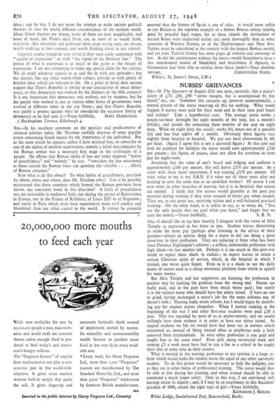SIR,—I should like to say how heartily I disagree with
the views of Miss Temple as expressed in her letter to you. Student nurses threatening to strike for more pay (perhaps after listening to the advice of their patients—always an unwise thing for a nurse to do) are doing a great disservice to their profession. They are reducing it from what has been since Florence Nightingale's reforms ; a selfless, honourable profession with high ideals—to just another job. Perhaps it is too mpch in this post-war world to expect these ideals to endure ; to expect nurses to retain a certain Christian spirit of service, which, in the hospital in which I trained, one never quite forgot. Even so it is a shock to see the daily duties of nurses used as a cheap emotional platform from which to appeal for more money.
But Miss Temple and her supporters are harming the profession in another way by tackling the problem from the wrong end. Nurses are badly paid, and in the past have been much worse paid ; but surely it is the trained nurse who should have her salary raised. (I have no axe to grind, having exchanged a nurse's job for the more arduous one of doctor's wife.) Nursing badly needs reform, but I would begin by abolish- ing pay for student nurses altogether. When I started training at the beginning of the war I and other first-year students were paid £20 a year. This was regarded by most of us as pocket-money, and we would willingly have done without it in order to have our status raised. As unpaid students we felt we would have had more say in matters which concerned us, instead of being treated often as employees only a little removed from kitchenmaids. In what other profession is one paid and taught free at the same time? Even girls doing secretarial work and earning £5 a week must have had to pay a fee to a school to be taught their jobs at some time in their careers.
What is needed in the nursing profession in my opinion is a large re- form which would make the student nurse the equal of any other university student. To do this grants would be necessary to help the indigent, just as they are in other forms of professional training. The nurse would thus be able to live during her training, and when trained should be able to command a much larger salary. Only in this way, I am convinced, will nursing retain its dignity ; and, if I may be so reactionary in this Socialists' paradise of 1948, attract the right type of girl.—Yours faithfully,


































 Previous page
Previous page